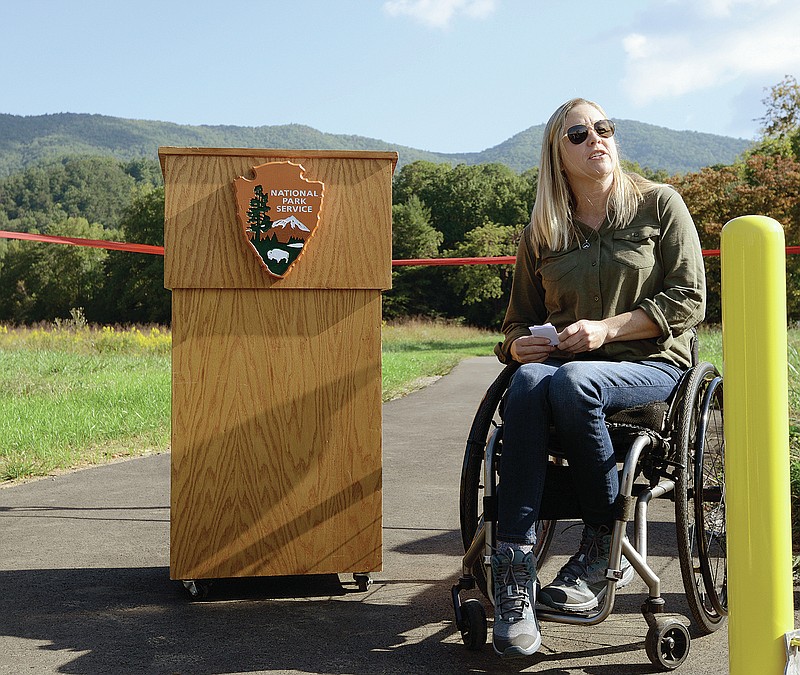GATLINBURG, Tenn. -- Before Great Smoky Mountains National Park officials and others cut the ribbon on the John Oliver Cabin accessible trail recently, Friends of the Smokies emeritus founding board member and former Tennessee Supreme Court Chief Justice Gary Wade remembered a poignant moment in U.S. history.
"To put this event today in historical perspective," Wade said, standing with the Cades Cove valley at his face and the cabin behind him, "81 years ago this month, Secret Service agents placed a blanket over the wheelchair of the president as he was lifted to the Rockefeller Monument to dedicate the Great Smoky Mountains National Park.
"President Franklin Roosevelt dedicated the park, which is now the most visited in the U.S. And, if Cades Cove were a park of its own, the Smokies would still be No. 1, but Cades Cove would be in the top six.
"Isn't it remarkable how many people enjoy this?" he said, gesturing to the valley, "and isn't it entirely appropriate today given a person in a wheelchair dedicated this park so many years ago, now we're able to access the John Oliver Cabin."
Moments later, three people in wheelchairs traveled up the path to the cabin for the first time.
According to park officials, it's the second accessible path in Great Smoky Mountains National Park -- Sugarlands Valley Nature Trail is the other one -- and the first to feature a historical site.
Park Superintendent Cassius Cash told the crowd of about 70 that the motivation to create accessible trails kicked into gear a couple of years after he came into the top Great Smoky Mountains National Park role in 2015.
"I issued this challenge to staff about three years ago about how I wanted to make more opportunities here, make the park more accessible," Cash said. "We have over 850 miles of trails in the park, and it's hard to believe that ... we didn't have one that's designated (for accessibility). ... But here we are today."
The project recognizes the need to accommodate any person who might not be able to traverse trails in the traditional ways.
Many people in their 70s and 80s, for instance, said Tuesday they were thankful to have an easy-to-walk path to the historical site.
Hiker, former firefighter and wheelchair user Carly Pearson said it was an honor to be able to hike up to the spot.
"We've come to the time where we are no longer sidelined by circumstances and physical barriers," Pearson told the crowd. "Being immersed into the natural environment allows opportunities to enjoy our lands independently."
The half-mile, paved trail is approximately 8 feet wide, providing space for wheelchairs or other mobility devices to pass one another. It is compliant with Architectural Barriers Act standards, park officials said.
Funding for the project was made possible through a $150,000 donation provided by the National Park Foundation and a $57,000 donation provided by the Friends of the Smokies.
"It is such an honor to partner with Superintendent Cash and his staff in helping fulfill this vision of making park experiences more accessible," Sharon Pryse, board of directors chair for Friends of the Smokies, said in a news release.
"I want people to enjoy this park," said Judy Morton, emeritus Friends of the Smokies board member. Her grandfather, Ben Morton, helped found the park. "That's what my grandfather wanted."
The park, in its founder's vision, was meant to be preserved. That's happened in numerous ways, and now it's the most popular park in the country, with 12.1 million visitors in 2020 alone.
John Oliver's great-great-great-grandson, John Oliver, was present with his wife Lori.
"Cades Cove has a special place in my heart," Oliver said.
The couple lives in Townsend and still sees the place in many ways as a part of their family's home.
"I'm glad it's preserved," he said of the cabin, "and that people get to enjoy it. It means a lot to our family."
The Oliver family settled at that site in 1818. John Oliver said Tuesday that part of his family's lore is the fact his ancestors might not have survived Cades Cove's winters were it not for the Native Americans.
Past and future co-mingle at the new accessible trail to Oliver's homesite. What represents heritage to some people also represents a vision to others.
"We talk about needing to create the next generation of users, supporters and advocates of the Park Service," Cash said in an interview after the ribbon-cutting as the small crowd started to use the trail for the first time. "But I think in our mind, we kind of say 'and people of all abilities' at the same time."
People often think about nationalities, backgrounds and ethnicities, he added, but sometimes forget able-bodied and non-able-bodied people.
That's changing now.
"I want to see how the public enjoys this trail, and then we'll look at what's next," Cash said.





